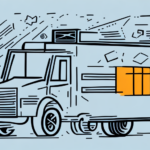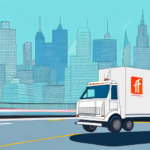Exploring the Benefits of Last Mile Logistics Companies
Last Mile Logistics has become a cornerstone of the logistics industry, particularly with the explosive growth of e-commerce. This segment refers to the final leg of the supply chain, where goods are transported from a transportation hub to the end customer’s doorstep. Considered the most critical and complex stage of the supply chain, last mile delivery involves navigating logistical challenges such as coordinating delivery schedules, managing inventory levels, optimizing delivery routes, and ensuring timely deliveries.
Understanding the Concept of Last Mile Logistics
Last Mile Logistics represents the final stage of the delivery process, crucial in meeting the increasing consumer demand for faster and more convenient delivery options. With the e-commerce sector projected to reach USD 24.3 trillion by 2025 [1], the role of last mile logistics is more significant than ever. This phase involves significant challenges, particularly in urban areas where traffic congestion is a persistent issue.
To address these challenges, companies are innovating with solutions like drone deliveries and electric vehicles, which help reduce traffic congestion and improve delivery efficiency. Additionally, the integration of smart technologies such as GPS tracking and real-time traffic updates allows for the optimization of delivery routes, enhancing overall operational efficiency.
The Role of Last Mile Logistics in the E-commerce Industry
The surge in e-commerce has revolutionized the logistics landscape, creating an unprecedented demand for efficient last mile delivery services. Last mile logistics companies are pivotal in ensuring seamless deliveries, reducing delivery times, and providing exceptional customer service. According to Statista, the global e-commerce market size was valued at USD 9.09 trillion in 2019 and is expected to reach USD 24.3 trillion by 2025.
The "last mile" challenge remains one of the most costly and time-consuming aspects of the delivery process. To mitigate these issues, companies are leveraging technologies like autonomous vehicles and delivery drones, which promise to enhance delivery efficiency and reduce operational costs.
Minimizing Delivery Time through Last Mile Logistics
One of the primary advantages of last mile logistics companies is their ability to minimize delivery times. By utilizing advanced technologies and analytics, these companies can optimize delivery routes and schedules, ensuring faster and more reliable deliveries. Tools such as GPS and real-time data analytics enable companies to monitor deliveries in real-time, allowing for immediate adjustments to address any unforeseen delays.
Moreover, offering flexible delivery options, such as same-day or next-day delivery, caters to customer preferences and reduces the likelihood of missed deliveries. This flexibility not only enhances customer satisfaction but also improves overall delivery efficiency.
The Advantages of Outsourcing Last Mile Logistics Services
Outsourcing last mile logistics offers numerous benefits, including the ability for businesses to focus on their core competencies rather than managing complex logistics operations. By partnering with specialized logistics companies, businesses can avoid the significant investment required for infrastructure, transportation vehicles, and delivery fleets.
Cost savings are another major advantage. Logistics companies possess the expertise to optimize delivery routes and reduce transportation expenses, minimizing the risk of delays and damages. Additionally, outsourcing allows businesses to scale their logistics operations up or down based on demand, providing flexibility without the burden of maintaining in-house logistics capabilities.
Enhanced customer satisfaction is also a key benefit. Advanced tracking and communication systems provided by logistics partners enable customers to monitor their orders in real-time, fostering transparency and reliability that contribute to positive customer experiences and loyalty.
The Role of Technology in Enhancing Last Mile Logistics Operations
Technological advancements have significantly transformed last mile logistics operations. Solutions such as GPS, real-time tracking, and customer-facing mobile applications streamline operations by reducing inefficiencies and optimizing delivery routes. These technologies enable companies to provide real-time updates to customers, enhancing the overall delivery experience.
- GPS Tracking: Allows for accurate tracking of delivery vehicles, ensuring timely arrivals.
- Real-Time Data Analytics: Facilitates dynamic route adjustments in response to traffic conditions.
- Mobile Applications: Provide customers with real-time updates and the ability to manage delivery preferences.
Comprehensive Guide to Choosing the Right Last Mile Logistics Partner
Selecting the appropriate last mile logistics partner is critical for ensuring efficient and reliable deliveries. Businesses should evaluate potential partners based on several key factors:
- Reputation and Experience: A proven track record in the industry indicates reliability and expertise.
- Technological Capabilities: Advanced technology solutions can enhance delivery efficiency and customer satisfaction.
- Delivery Network: A robust delivery network ensures broader coverage and faster delivery times.
- Pricing Models: Competitive and transparent pricing structures are essential for cost-effective operations.
- Alignment with Business Values: Ensuring that the logistics partner shares similar values can foster a stronger working relationship.
Top Trends Shaping the Future of Last Mile Logistics
The last mile logistics industry is continuously evolving, driven by emerging trends that enhance delivery efficiency and customer satisfaction. Key trends include:
- Delivery Robots and Drones: Automating deliveries to reduce costs and increase speed.
- On-Demand Delivery Services: Catering to the increasing consumer demand for immediate delivery options.
- Sustainable Logistics Solutions: Implementing eco-friendly practices to reduce the environmental impact of deliveries.
These trends are set to revolutionize the industry, providing customers with faster, more reliable, and sustainable delivery options.
The Impact of COVID-19 on the Last Mile Logistics Industry
The COVID-19 pandemic has had a profound impact on the logistics industry, with last mile logistics services experiencing a significant surge in demand. The shift towards online shopping during lockdowns and restrictions has underscored the importance of efficient last mile delivery systems. In response, logistics companies have adopted safety measures such as contactless deliveries and enhanced sanitization protocols to protect both customers and employees.
This period also accelerated the adoption of digital solutions, with companies investing in technologies that facilitate remote operations and enhance delivery efficiency amidst challenging circumstances.
Challenges Faced by Last Mile Logistics Companies and Solutions
Last mile logistics companies encounter several challenges that can affect their operations and profitability:
- Traffic Congestion: Leads to delays and increased fuel consumption.
- Driver Shortages: Impacts the ability to meet delivery demands.
- Delivery Delays: Result from various factors, including weather conditions and logistical inefficiencies.
To overcome these challenges, companies are leveraging technology solutions such as route optimization software, partnering with reliable transportation providers, and implementing efficient inventory management practices. Additionally, adopting flexible working arrangements can help mitigate driver shortages.
The Importance of Customer Satisfaction in Last Mile Logistics
Customer satisfaction is paramount in the last mile logistics industry. With the rise of e-commerce, consumers expect faster delivery times and seamless service. To meet these expectations, logistics companies must prioritize:
- Real-Time Tracking: Provides transparency and allows customers to monitor their deliveries.
- On-Time Deliveries: Ensures reliability and builds trust with customers.
- Responsive Customer Support: Addresses any issues promptly, enhancing the overall customer experience.
By focusing on these aspects, last mile logistics companies can foster strong customer relationships, leading to repeat business and positive reviews.
How Last Mile Logistics Contributes to Sustainable Business Practices
Sustainability is increasingly important in today’s business environment. Last mile logistics companies contribute to sustainable practices by:
- Implementing Eco-Friendly Delivery Solutions: Using electric vehicles and optimizing routes to reduce carbon emissions.
- Green Packaging: Utilizing recyclable or biodegradable packaging materials to minimize environmental impact.
- Efficient Route Planning: Reduces fuel consumption and lowers the carbon footprint of delivery operations.
Furthermore, partnering with sustainable suppliers and promoting environmental awareness among customers reinforces a company’s commitment to sustainability.
The Economics Behind the Growth of Last Mile Logistics Companies
The growth of last mile logistics companies is driven by several economic factors, including the exponential rise of e-commerce and the cost-effectiveness of outsourcing logistics operations. As businesses increasingly rely on online sales, the demand for efficient last mile delivery services continues to soar. Additionally, outsourcing logistics allows businesses to leverage specialized expertise and infrastructure without the associated capital expenditures.
The scalability provided by outsourcing is another economic advantage, enabling companies to adjust their logistics capabilities in response to fluctuating demand without significant financial burden.
The Future of Last-Mile Delivery: Innovations and Opportunities
The future of last-mile delivery is poised for significant advancements, driven by innovations in technology and emerging opportunities in various sectors. Key innovations include:
- Autonomous Delivery Vehicles: Enhancing delivery efficiency and reducing labor costs.
- Drones and Robotics: Streamlining the delivery process and reaching hard-to-access areas.
- Smart Lockers and Pickup Points: Offering alternative delivery options that enhance convenience for customers.
Opportunities also abound in expanding services to new markets such as healthcare, food delivery, and other essential services, providing avenues for growth and diversification for last mile logistics companies.
A Comparative Analysis of Different Last-Mile Delivery Models
Businesses can choose from various last-mile delivery models, each with its own set of advantages and disadvantages:
- In-House Logistics Operations: Offers greater control but requires significant investment in infrastructure and personnel.
- Outsourcing to Third-Party Logistics Providers (3PLs): Provides expertise and scalability but may result in less direct control over delivery operations.
- Peer-to-Peer Delivery: Utilizes the capacity of individual drivers, offering flexibility but potentially inconsistent service quality.
- On-Demand Delivery Services: Meets immediate delivery needs but can be costlier and more complex to manage.
Businesses must evaluate their specific needs, resources, and priorities to determine the most suitable delivery model.
Evaluating the Cost-Benefit Analysis of In-House vs. Outsourced Last-Mile Logistics Operations
Deciding between in-house and outsourced last-mile logistics involves a thorough cost-benefit analysis. Key considerations include:
- Cost: Outsourcing can be more cost-effective by eliminating infrastructure and personnel expenses, while in-house operations may incur higher fixed costs.
- Control: In-house operations offer greater control over the delivery process, whereas outsourcing may limit direct oversight.
- Scalability: Outsourced logistics provide flexibility to scale operations based on demand, which is often more challenging with in-house systems.
- Expertise: Specialized logistics providers bring industry expertise and advanced technologies that may not be feasible to develop internally.
Businesses should weigh these factors against their strategic goals and operational capabilities to make an informed decision.
Tips to Optimize Your Last-Mile Delivery Strategies and Boost Business Growth
Optimizing last-mile delivery strategies is essential for enhancing operational efficiency and driving business growth. Here are some actionable tips:
- Implement Real-Time Tracking: Allows for monitoring of deliveries and quick resolution of any issues that arise.
- Optimize Delivery Schedules: Use data analytics to determine the most efficient delivery times and routes.
- Leverage Technology Solutions: Invest in software and tools that streamline logistics operations and improve communication.
- Partner with Reliable Transportation Providers: Ensure that delivery partners are dependable and aligned with your service standards.
- Enhance Customer Service: Provide exceptional support and communication to improve the overall customer experience and foster loyalty.
Case Studies: Success Stories of Leading Last-Mile Logistics Companies
Examining the success stories of leading last-mile logistics companies like UPS, Amazon, and DHL offers valuable insights into effective strategies and best practices:
- Amazon: Invested heavily in its logistics network, including the development of Amazon Prime Air for drone deliveries, enhancing delivery speed and reliability.
- UPS: Utilizes advanced route optimization software and invests in sustainable delivery vehicles, improving efficiency and reducing environmental impact.
- DHL: Implements smart lockers and collaborates with local retailers for last-mile deliveries, providing customers with flexible and convenient delivery options.
These companies demonstrate the importance of innovation, technological integration, and customer-centric approaches in achieving logistics excellence. Businesses can adopt similar strategies to enhance their own last-mile delivery operations.
In conclusion, last mile logistics companies are indispensable in today’s logistics landscape, particularly within the e-commerce sector. By ensuring seamless deliveries, reducing delivery times, and delivering exceptional customer service, these companies play a crucial role in business success. Embracing technological advancements and efficient logistics practices will be key to staying competitive and meeting the evolving demands of customers.
For more information and advanced logistics solutions, visit our website at www.shipscience.com.
References:






















